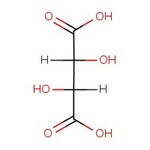Search Thermo Fisher Scientific
Thermo Scientific Chemicals
L-(+)-Tartaric acid, 99%, Thermo Scientific Chemicals
Catalog number: A13668.36
500 g, Each



Thermo Scientific Chemicals
L-(+)-Tartaric acid, 99%, Thermo Scientific Chemicals
Catalog number: A13668.36
500 g, Each
Quantity
Catalog number: A13668.36
also known as A13668-36
Price (USD)
Price: 44.70
Online price: 37.65
Your price:
Quantity
-
Chemical Identifiers
CAS
87-69-4
IUPAC Name
2,3-dihydroxybutanedioic acid
Molecular Formula
C4H6O6
InChI Key
FEWJPZIEWOKRBE-UHFFFAOYNA-N
SMILES
OC(C(O)C(O)=O)C(O)=O
Specifications
Form
Crystals or crystalline powder or powder
Assay from Supplier's CofA
≥98.5% (U.S. sourced material)
Comment
Material Sourced in the U.S. and in other countries
Identification (FTIR)
Conforms
Melting Point
164-172°C (non-U.S. sourced material)
Description
L-(+)-Tartaric acid is widely utilized in pharmaceutical industries. It is used in soft drinks, confectionaries, food products, gelatin desserts and as a buffering agent. It forms a compound, TiCl2(O-i-Pr)2 with Diels-Alder catalyst and acta as a chelate agent in metal industries. Owing to its efficient chelating property towards metal ions, it is used in farming and metal industries for complexing micronutrients and for cleaning metal surfaces, respectively.
This Thermo Scientific Chemicals brand product was originally part of the Alfa Aesar product portfolio. Some documentation and label information may refer to the legacy brand. The original Alfa Aesar product / item code or SKU reference has not changed as a part of the brand transition to Thermo Scientific Chemicals.
Applications
L-(+)-Tartaric acid is widely utilized in pharmaceutical industries. It is used in soft drinks, confectionaries, food products, gelatin desserts and as a buffering agent. It forms a compound, TiCl2(O-i-Pr)2 with Diels-Alder catalyst and acta as a chelate agent in metal industries. Owing to its efficient chelating property towards metal ions, it is used in farming and metal industries for complexing micronutrients and for cleaning metal surfaces, respectively.
Solubility
Soluble in water, methanol and acetone.
Notes
Incompatible with oxidizing agents, bases and reducing agents.
L-(+)-Tartaric acid is widely utilized in pharmaceutical industries. It is used in soft drinks, confectionaries, food products, gelatin desserts and as a buffering agent. It forms a compound, TiCl2(O-i-Pr)2 with Diels-Alder catalyst and acta as a chelate agent in metal industries. Owing to its efficient chelating property towards metal ions, it is used in farming and metal industries for complexing micronutrients and for cleaning metal surfaces, respectively.
Solubility
Soluble in water, methanol and acetone.
Notes
Incompatible with oxidizing agents, bases and reducing agents.
RUO – Research Use Only
Figures
Documents & Downloads
Certificates
Search by lot number or partial lot number
Frequently asked questions (FAQs)
Citations & References
Search citations by name, author, journal title or abstract text